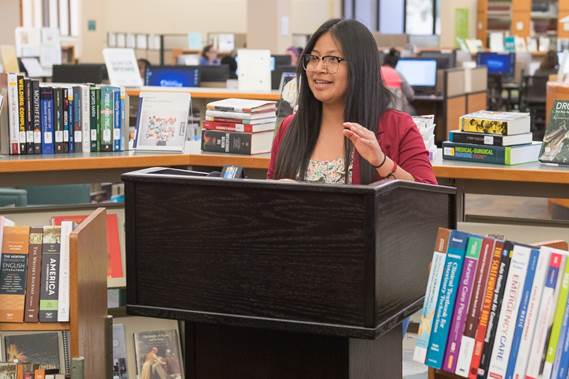Staff Report
Hancock College student Janet Cruz-Reyes knows firsthand about the burden of paying for textbooks, because she spends anywhere from $200 to $500 on books each semester.
But Hancock is trying to reduce those costs by making more textbooks available for free use in the library.
“I had to get a second job because I could barely make ends meet with one job,” said Cruz-Reyes, the president of the Associated Student Body Government. “The money spent on books becomes a problem because many college students also have to pay for transportation, food, other school supplies, and sometimes child care and rent.”
Nationally, consumer prices for textbooks have climbed 88 percent over the last 10 years, and a 2017 survey of Hancock students quantifies the impact of textbook prices. Sixty-five percent of students said they dropped or withdrew from a class due to the price of a required textbook. Sixty-one percent of students, like Cruz-Reyes, spend at least $200 per semester on textbooks. Fifty-three percent did not purchase a required textbook because of the cost, and 45 percent of students did not register for a course because of the price of the textbook.
“I have taken a course and did not purchase the required textbooks because it was too expensive. In some cases, the classes required up to four books,” said Cruz-Reyes, a political science major.
The college recently announced the purchase of up to $40,000 in new textbooks that will be available to all students in the library. Nearly 250 books, all required by instructors, were purchased with funding from the President’s Circle, a group of nearly 100 community and business leaders whose donations allow the college to assist thousands of students by funding unique opportunities and programs. The Hancock College Foundation operates and manages the unrestricted funds.
The purchase nearly doubles the number of textbooks on reserve in the college’s Santa Maria and Lompoc Valley Center libraries.
The books will be available to students to use for two hours at a time in the library at no charge.
“This is about accessibility,” said Robert Curry, Ph.D., the college’s academic dean who oversees the library. “When you add the 50 textbooks donated every semester to the library by Follett, the company that runs the campus bookstore, our students should be able to get their hands on any required textbook.”
Over the last few years, President’s Circle funding allowed the college to create a new laboratory technician position for high-demand biology classes, launch a pilot program for foster youth, and start and expand a food-share program that provides fresh produce and non-perishable food to hundreds of students twice a month.
“I think students are fortunate the college is stepping up to provide a copy of every textbook. I have personally benefited from books in the library reserve and know that thousands more will as a result of this donation,” Cruz-Reyes added.
Recently, the college also received a $200,000 grant to launch three “Zero Textbook Cost” (ZTC) degrees in fall 2018. As part of a pilot program, students will be able to complete the required courses for three associate degrees for transfer without purchasing a single textbook. Those degrees will be in political science, liberal arts math and science, and liberal arts social and behavioral science.
Using enrollment numbers from 2016-17, the college projects that 39,985 students will earn more than 1,000 ZTC degrees during a three-year period after implementation. Based on the estimate that a student will save $100 to $200 each semester on books, the college projects students will save between $4 million and $8 million.







